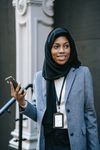Islam in the Welcoming Workplace - A guide for inclusive relationships.
←
→
Page content transcription
If your browser does not render page correctly, please read the page content below
Islam
in the Welcoming Workplace
A guide for inclusive relationships.
Worldwide about 23% of all people are Muslim. It is
considered the fastest growing of the major religions and it
may be one of the most misunderstood.
This guide is a short overview of a fascinating religion, designed to give
readers information to help foster a welcoming and respectful
workplace. Please remember that Muslims are diverse, varying by
sect, culture, level of adherence, and personal interpretation. If you are
curious about whether this information applies to your Muslim
colleagues, we invite you to start a conversation.
Encounter World Religions can help you learn more about
religious literacy and how to create a welcoming workplace.
worldreligions.caIslam - The Basics
To create a welcoming workplace it helps to know a bit about each other.
Knowing the basics about religion can increase our comfort with one
another and makes us feel more connected. Islam is built upon 5 key
pillars or practices that almost all Muslims recognize:
Shahada is the declaration of faith. Muslims proclaim out loud that “there is
no god but God and Muhammad is his messenger.” Shia Muslims add “and Ali
is the friend of God.”
Salat is the prayer which Muslims do 5 times
each day while facing Mecca. Devotees submit to
God by touching their head to the ground. Each
prayer takes just a few minutes. Devotees
perform ablutions (washing hands, feet and face)
before prayer although not always for every
prayer since an earlier ablution sometimes
suffices. Shia Muslims sometimes group the
prayers, doing all 5 prayers in just three time slots
by doing two back-to-back.
Zakat which translates to charity requires Muslims
to give 2.5% of one’s wealth (not income) to the
needy.
Sawm refers to the fast of Ramadan where one does
not eat, drink or have sex during daylight hours for
one month. Ramadan is also a time when Muslims try
to reform the self by refraining from gossip, being
kinder to others and turning to God.
Hajj is a pilgrimage to Mecca that is obligatory to do
once in your life (health and wealth permitting).
Pilgrims don special garments that erase class
distinctions.
worldreligions.caGreetings and Holidays
The two most significant holidays are Eid al-Adha which marks the end of the
hajj and Eid al-Fitr which indicates the end of Ramadan. Both include special
prayers at the mosque, gathering with family and community, exchanging
food and gifts, and donating to the poor.
Eid Mubarak (Blessed Eid) is the common greeting on both days, Staff may
request these days off and in some sects or cultures, additional days are also
celebrated. The Islamic calendar is lunar, shifting about 10 days on the
Western calendar every year, meaning holidays have no fixed Western dates.
Cultural Awareness
Physical Contact: Some Muslims refrain from physical contact across gender
lines, such as hugging or shaking hands. You can always reciprocate (i.e. shake a
hand that is offered) but if you’re initiating the contact and are unsure, just ask.
Prayer times and spaces: Muslims pray fives times daily, two of which often fall
during the typical workday. To pray, employees may need time, a private place,
and an opportunity to do ablutions (washing) ahead of time. Prayer takes about
10 minutes.
Food: Many Muslims avoid consuming alcohol, eating
pork or pork derivatives (e.g. gelatin), and any meat that
is not halal (meaning ritually slaughtered). Providing halal
options allows Muslim employees to be included in
eating, which is a deeply social activity. Food is a way
humans include (or exclude) others so think about how
to ensure everyone can eat together.
In addition, many Muslims fast during Ramadan. During this month, It's
respectful to avoid scheduling lunch meetings or any gatherings where food will
be set in front of staff or where fasting employees must watch others eat. Where
possible, scheduling meetings in the morning or early afternoon is also helpful as
energy wanes later in the day.
worldreligions.ca5 Interesting Facts about Islam
Very few Muslims are Arabs (maybe 15%) and most don’t speak Arabic (but
may know a little for prayers).
The Muslim prayer has a kind of intimacy in
that people stand right next to one another,
shoulder to shoulder, with no buffer space.
You simply line up in whatever order you
arrived. It fosters a sense of cohesion among
the “ummah” or community during prayer.
When Muslims go to the hajj they wear special garments and are later buried in
those same garments when they die. They are laid in the tomb, facing Mecca,
dressed as a pilgrim.
Ramadan is famous for fasting but it is also
very communal. Devotees share a sense of
struggling together through an ordeal and then
end the fast every evening with family and
often with the larger community at the iftar
meal. Ramadan ends with Eid-al-Fitr, a day of
feasting and the second biggest sacred day in
Islam. The day often creates a sense of having
been renewed through personal sacrifice.
Mosques around the world have two types
of décor, based on two types of revelations.
First is calligraphy which records the writings
from the Qur’an, one of the revelations from
God. The second décor is geometric patterns
to reflect the second revelation, which is
creation itself. Creation is also a revelation
and is orderly and hence the mathematics of
geometric patterns reflects this orderliness.
worldreligions.caDiscovering Our Misconceptions
Sometimes what we think we know isn't accurate. We're all susceptible
to misconceptions and it is good practice to check our assumptions.
Misconception: Muslims pray facing the east.
Muslims actually pray facing Mecca, which is in Saudi Arabia. In North
America, you face east. In South Africa, you would face north, west from
India and south from Norway. If you’re in Mecca itself? You face the
kaaba, the sacred building and central place of worship for Muslims.
Misconception: Muslims' beliefs about being gay are…
The catch is there is no single answer. Some Muslims disapprove of gay relations, some are
accepting, and some are themselves gay. Muslims, Hindus, atheists all have varied views on
feminism, the environment and politics. Every group, every community is internally diverse.
Beware of what novelist Chimamanda Ngozi Adichie calls the “Danger of a Single Story.”
No community is a monolith.
Misconception: Women wear headscarves to submit to their husbands. Some
Muslim women wear the hijab, doing so in submission to Allah. But views vary.
Some follow it as God’s command, some are less observant, and some believe it
has human origins. While some governments forcibly impose dress codes, the
Qur’an says “there is no compulsion in religion” (2:256) and so many Muslims
believe it should be a woman’s decision.
Misconception: Islam seems to be a violent religion.
Every religion has violence and goodness in its history. Broken societies
produce more violence and Muslim extremists – the Taliban, ISIS, suicide
bombers – are all recent inventions in societies that suffered colonialism.
Less often heard: Muslims are likely the most victimized religious group
from China's Uyghurs to Myanmar's Rohingyas. Even Muslim extremist groups’
number one victim is ordinary Muslim families trying to stay safe.
Misconception: Shariah Law is what they have in Afghanistan. There is no singular thing
called “shariah” or “shariah law.” It’s like saying “Western law” – do you mean Dutch or Canadian?
City bylaws or federal statutes? American laws in 1840 or 2020? The versions that receive the
most media attention (e.g. such as in Afghanistan) are considered extremist corruptions by many
Muslims and are also very new and inconsistent with how shariah was traditionally practiced.
worldreligions.caWant to learn more?
For more than 20 years Encounter World
Religions has provided religious literacy and
inclusion programs as well as consulting services
to help businesses, organizations and institutions
create welcoming workplaces.
Our popular talks, The Religiously Literate
Leader, and Religious Literacy and the
Welcoming Workplace are excellent foundations
for building religious literacy for your Diversity,
Equity, Inclusion and Belonging initiatives. Our
Discovering Identities series invites deeper,
focused exploration of the world's major religions.
This guide is a small taste of what is covered in
our talk on Islam.
We also offer engaging in-person and virtual
programming for individuals who want to dig a little
deeper.
Our Discovery Week, held in Toronto each summer,
is an entertaining and enlightening tour of 11
religions and more than 20 site visits. It's like
traveling the world in a week.
All of Encounter's programs are taught from a non-sectarian
perspective and are welcoming to all.
Learn more about our programs on our website at worldreligions.ca
or follow our blog at www.religionsgeek.com.
We also invite you to connect with us on LinkedIn, Facebook and Twitter.
Encounter World ReligionsYou can also read



























































